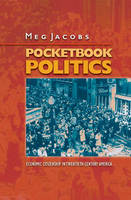
Pocketbook Politics
Princeton University Press (Verlag)
978-0-691-08664-4 (ISBN)
- Titel ist leider vergriffen;
keine Neuauflage - Artikel merken
"How much does it cost?" We think of this question as one that preoccupies the nation's shoppers, not its statesmen. But, as "Pocketbook Politics" dramatically shows, the twentieth-century American polity in fact developed in response to that very consumer concern. In this groundbreaking study, Meg Jacobs demonstrates how pocketbook politics provided the engine for American political conflict throughout the twentieth century. From Woodrow Wilson to Franklin Roosevelt to Richard Nixon, national politics turned on public anger over the high cost of living.Beginning with the explosion of prices at the turn of the century, every strike, demonstration, and boycott was, in effect, a protest against rising prices and inadequate income. On one side, a reform coalition of ordinary Americans, mass retailers, and national politicians fought for laws and policies that promoted militant unionism, government price controls, and a Keynesian program of full employment. On the other, small businessmen fiercely resisted this low-price, high-wage agenda that threatened to bankrupt them.This book recaptures this dramatic struggle, beginning with the immigrant Jewish, Irish, and Italian women who flocked to Edward Filene's famous Boston bargain basement that opened in 1909 and ending with the Great Inflation of the 1970s.
"Pocketbook Politics" offers a new interpretation of state power by integrating popular politics and elite policymaking. Unlike most social historians who focus exclusively on consumers at the grass-roots, Jacobs breaks new methodological ground by insisting on the centrality of national politics and the state in the nearly century-long fight to fulfill the American Dream of abundance.
Meg Jacobs is Associate Professor of American History at the Massachusetts Institute of Technology, She is the co-editor of "The Democratic Experiment: New Directions in American Political History" (Princeton).
List of Illustrations ix Acknowledgments xi Introduction Economic Citizenship in the Twentieth Century 1 PART I. THE HIGH COST OF LIVING AND THE RISE OF POCKETBOOK POLITICS, 1900-1930 Chapter One: From the Bargain Basement to the Bargaining Table, 1900-1917 15 Chapter Two: Business without a Buyer, 1917-1930 53 PART II. PURCHASING POWER TO THE PEOPLE, 1930-1940 Chapter Three: The New Deal and the Problem of Prices, 1930-1935 95 Chapter Four: The New Deal and the Problem of Wages, 1935-1940 136 PART III. THE EVILS OF INFLATION IN WAR AND PEACE, 1940-1960 Chapter Five: The Consumer Goes to War, 1940-1946 179 Chapter Six: Pocketbook Politics in an Age of Inflation, 1946-1960 221 Epilogue: Back to Bargain Hunting 262 Notes 266 Index 327
| Erscheint lt. Verlag | 12.12.2004 |
|---|---|
| Reihe/Serie | Politics and Society in Twentieth-Century America |
| Zusatzinfo | 20 halftones. |
| Verlagsort | New Jersey |
| Sprache | englisch |
| Maße | 152 x 235 mm |
| Gewicht | 652 g |
| Themenwelt | Sachbuch/Ratgeber ► Geschichte / Politik ► Allgemeines / Lexika |
| Geschichte ► Allgemeine Geschichte ► Neuzeit (bis 1918) | |
| Geisteswissenschaften ► Geschichte ► Regional- / Ländergeschichte | |
| Geschichte ► Teilgebiete der Geschichte ► Kulturgeschichte | |
| Sozialwissenschaften ► Politik / Verwaltung | |
| ISBN-10 | 0-691-08664-8 / 0691086648 |
| ISBN-13 | 978-0-691-08664-4 / 9780691086644 |
| Zustand | Neuware |
| Haben Sie eine Frage zum Produkt? |
aus dem Bereich


